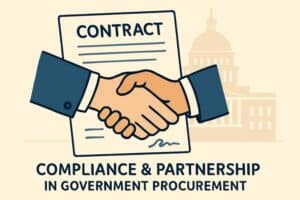Table of Contents
- Introduction
- Understanding Procurement Lobbying
- The Importance of Compliance
- Developing Effective Compliance Programs
- Staying Informed About Regulatory Changes
- Conclusion
Introduction
Government procurement is crucial for public infrastructure and services, generating trillions of dollars in contracts annually. However, it’s also linked to procurement lobbying, a complex landscape with strict regulations and oversight. Businesses must understand and adhere to these legal standards to secure and maintain eligibility for government contracts. Noncompliance can derail business prospects or hinder entry into lucrative procurement spaces. Compliance with government contract laws is essential for long-term success and ethical engagement in the public sector. These laws aim to prevent corruption, favoritism, and undue influence, prioritizing the public’s interest over private gain. Noncompliance can lead to severe penalties, reputational damage, and disqualification from government opportunities.
Understanding Procurement Lobbying
Procurement lobbying involves businesses, consultants, or advocacy groups influencing government agencies to award contracts. It can take various forms, including policy and technical requirements shaping, technical clarifications, and meetings with decision-makers. Compliance with complex rules by federal, state, and local governments is complex due to conflicts of interest and undue influence. Organizations must register lobbyists, adhere to disclosure schedules, and document interactions with government employees. Mistakes can occur quickly, emphasizing the need for vigilance and ongoing education.
The Importance of Compliance
Adhering to procurement lobbying laws is far more than a regulatory requirement—it is a competitive necessity in today’s public marketplace. Government entities operate under strict scrutiny, and any appearance of impropriety or policy violation can halt ongoing negotiations or even permanently bar a company from participating in future bids. Enforcement agencies investigate and act swiftly against violations, imposing heavy fines, reputational fallout, and even blacklisting offenders from bidding on future contracts. A notable example: in 2024, the U.S. Department of Justice’s Procurement Collusion Strike Force expanded its collaborations nationwide, signaling intensified enforcement and expanded detection capabilities in response to increased antitrust concerns in public contracting.

The Ramifications of Non-Compliance
Beyond the immediate financial penalties, violations can irreparably damage a company’s public image, potentially drawing negative attention from media and watchdog groups, and eroding trust among clients and regulators. The negative press that follows a compliance scandal can dry up partnerships, fragment internal teams, and prompt existing government clients to reconsider contracts. The loss of current or future contracting opportunities may prove far costlier than any initial infraction. Furthermore, legal proceedings can tie up substantial resources, exacting both financial and operational tolls that further threaten an organization’s stability.
Developing Effective Compliance Programs
Robust internal programs are the cornerstone of preventing costly mistakes. Companies must build a compliance culture that values ethics as much as efficiency, starting with clear leadership and reinforced through every level of management. Effective compliance involves comprehensive training, diligent monitoring, and transparent reporting:
- Employee Training: Routine education on evolving legal standards and ethical requirements ensures staff at every level recognize prohibited practices and understand proper communication channels. Training should cover the nuances of procurement lobbying laws, practical examples of acceptable and prohibited conduct, and drill scenarios to test readiness. Well-trained employees are less likely to make inadvertent errors that trigger regulatory scrutiny.
- Activity Monitoring: Implement technology and tracking systems to capture all lobbying-related activities and communications, ensuring alignment with applicable reporting thresholds and disclosure requirements. This visibility helps compliance teams spot irregularities or emerging risks before they escalate. The integration of automated compliance tools can provide early alerts and help streamline audits.
- Transparent Reporting: Empower employees to report lobbying efforts and potential issues proactively through established internal procedures, while ensuring mandatory external disclosures are timely and accurate. Creating an open-door policy encourages employees to surface weaknesses and ask questions without fear of retaliation, which can help organizations address problems early and maintain regulatory confidence.
These foundational steps not only reduce the risk of unintentional violations but also demonstrate a company’s commitment to integrity—a quality that increasingly influences contract award decisions. In government procurement, contractors known for robust compliance cultures are often regarded as more trustworthy and attractive partners, offering an advantage over competitors with less comprehensive programs.
Staying Informed About Regulatory Changes
Procurement regulatory changes can be swift, as lawmakers respond to emerging risks and public demand for accountability. Virginia’s 2025 broadening of “lobbying” to include procurement communications with executive branch officials expanded the scope of activities subject to registration and disclosure. To stay ahead, businesses should subscribe to industry newsletters, participate in trade associations, invest in legal counsel, and leverage government compliance resources. Trusted compliance partners can interpret new rules, while in-house compliance teams monitor government bulletins and relevant case decisions. Proactive adaptation signals an ongoing commitment to ethical public sector engagement.
Conclusion
Succeeding in government procurement means more than submitting a competitive bid—it requires a deep understanding of procurement lobbying laws and a commitment to compliance at every stage. Companies that lead with ethics and embrace transparency are better positioned to win contracts and build sustainable relationships with government agencies. By investing in effective compliance programs, staying alert to evolving regulations, and demonstrating unwavering ethical standards, businesses can safeguard their opportunities and build lasting partnerships with government agencies. Prioritizing compliance is a strategic advantage that fosters trust, mitigates risk, and supports sustained growth in the public sector marketplace.






